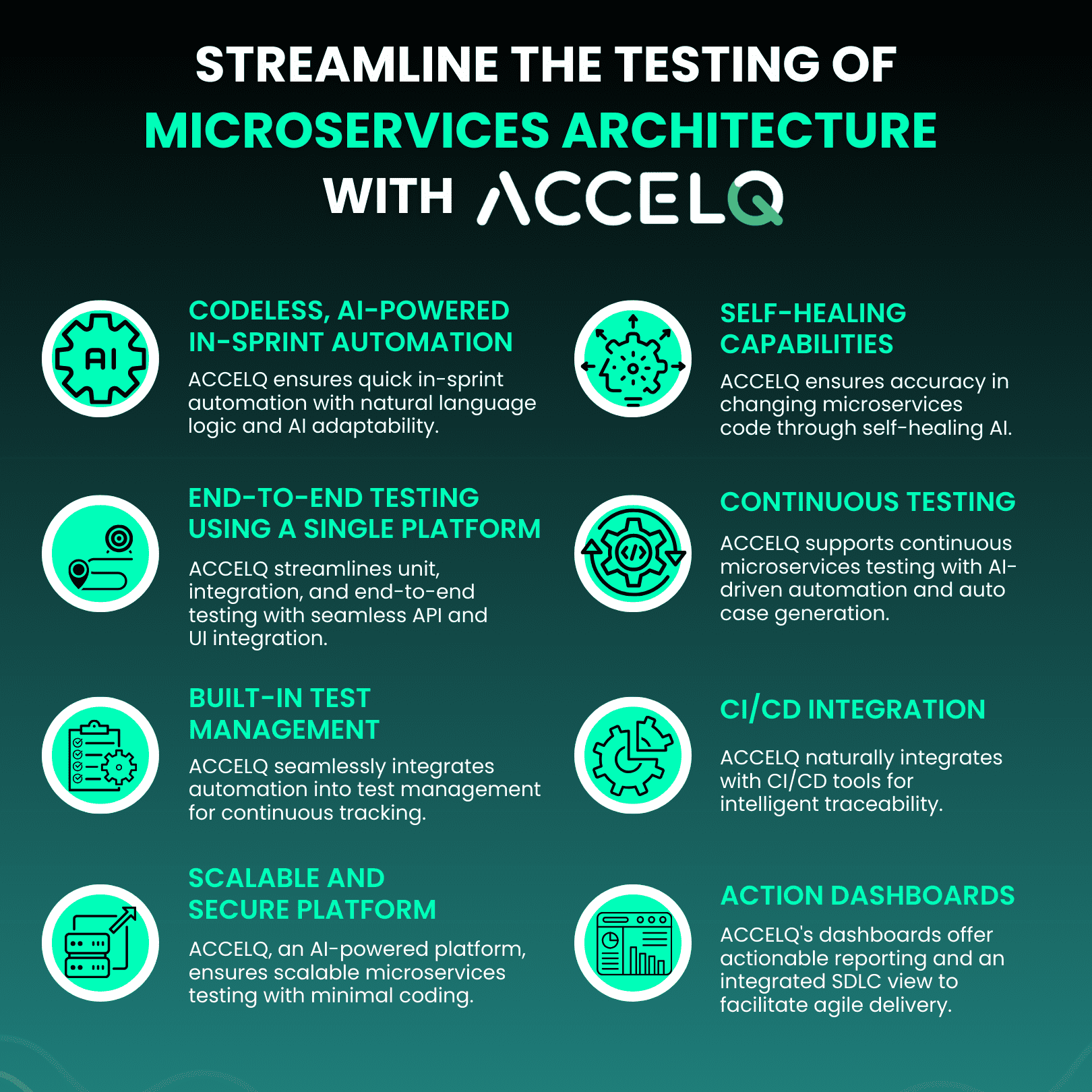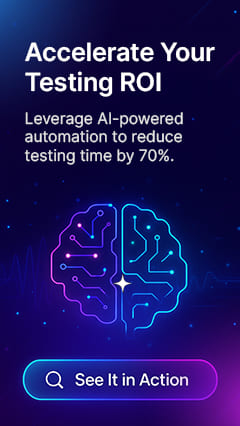Testing in Microservices Architecture with ACCELQ

In a 2021 IBM survey, IT executives and developers outlined more than a dozen use cases for the microservices architecture. These ranged from data analytics to database applications, customer relationship management, finance, HR applications, and more.
Over the past few years, the world has seen a surge in microservices adoption. However, testing microservices presents unique challenges as opposed to testing monolithic applications. Organizations must address these to maximize the return from their investments in the microservices architecture.
What Is Microservices Architecture?
Testing is crucial to ensuring the reliability, scalability, and maintainability of microservices apps. However, the distributed nature of microservices makes testing extremely complex. Let's look at some microservices architecture testing challenges:
- Dependency between services: Dependencies between services and modules make testing very difficult. As a result, testing teams have a tough time figuring out the root cause of a code break or bug.
- Unit and end-to-end testing: In microservices testing, teams must conduct thorough unit testing of all the independent components. They must also conduct end-to-end testing to ensure they work together well as one extensive system.
- Extensive test coverage: Since microservices applications are a group of hundreds of individual elements, they demand comprehensive test coverage. However, testing every new module or component as it is introduced is challenging.
- Constantly changing code: Different teams continuously work to develop and deploy new features and updates. This causes the underlying code to change frequently. Testing a codebase that is so volatile can get tricky.
All these challenges make it vital for organizations to automate microservices testing. Automation makes it easy to test frequent changes to microservices architecture. In essence, testers can perform quick and accurate tests with test automation. They can also improve the depth and scope of testing. Furthermore, automation helps in quickly simulating more users, allowing for better test quality and coverage.
How To Streamline the Testing of Microservices Architecture With ACCELQ?
Microservices testing is a complex and time-consuming process. As teams make changes and add new services, they need to update and expand their testing strategies. They must also use tools that enable them to maintain the overall reliability of their microservices architecture.
In the world of microservices, ACCELQ offers a diverse array of intelligent and automated testing capabilities. As a powerful codeless test automation platform, it gives testers the power to accelerate microservices testing.
ACCELQ's powerful natural language editor and design-first approach allow testers to scale different aspects of the microservices architecture easily. Since the platform is codeless, there is no issue of a steep learning curve. Testers can quickly and seamlessly get started with testing using a variety of codeless features.
Here's how you can streamline the testing of microservices architecture with ACCELQ:
Codeless, AI-powered In-Sprint Automation
ACCELQ allows for quick in-sprint automation. Testers can develop automation test logic in natural language and use an array of open-source assets. Moreover, intelligent change management and a powerful reconciliation engine help address in-sprint volatility. This allows for seamless modularity and reusability.
Self-Healing Capabilities
In a microservices architecture, the underlying codebase is constantly changing. However, ACCELQ's self-healing capabilities produce accurate test results. The platform's analytic runtime engine paves the way for reliable test execution. By intelligently adapting to unexpected application changes, ACCELQ's design-first approach ensures robust element ID based on AI.
End-to-End Testing Using a Single Platform
Microservices architecture requires testers to conduct thorough unit, integration, and end-to-end testing. With ACCELQ, testers can achieve all of this on a single platform. The platform offers the unique ability to integrate API and UI testing in the same flow. As a result, testers can enable true end-to-end validation without unnecessary, time-consuming handoffs.
Continuous Testing
With ACCELQ, testing teams can ensure continuous testing of microservices architecture. Cloud-based, AI-powered testing allows for the seamless testing and management of test assets across multiple revisions of the application. Because test case generation is automated, teams can also capture test data structure based on business semantics.
Built-in Test Management
In ACCELQ, automation is embedded as an integral part of test management. Using this platform, testers can easily track development, test, and quality readiness on a continuous and actionable basis. They can also develop dynamic test plans based on requirements or risk factors.
CI/CD Integration
ACCELQ offers native integration and natural traceability with CI/CD tools such as Jira, Jenkins, etc. Such integration allows testers to redefine traceability with an intelligent, connected test repository.
Scalable and Secure Platform
As an AI-powered test automation platform, ACCELQ allows for seamless scalability of microservices testing. Testers can automate superfast with no coding and little maintenance. Using ACCELQ's app universe and analytic-based algorithms, they can drive automated test planning and maximize coverage.
Action Dashboards
ACCELQ's action dashboards take microservices testing to an entirely new level. They can enable 360-degree actionable reporting. They can also help with an integrated view of the entire SDLC and enable the agile delivery of applications.
Get Started with Microservices Architecture Testing with ACCELQ
When testing microservices architecture, teams need a modern platform that fits into the complex ecosystem. To that end, ACCELQ automates all aspects of the microservices quality lifecycle – with no programming. The platform is scalable, secure, and enterprise-ready. It enables in-sprint automation with built-in modularity.
Using a single platform, testers can test individual components. They can also test the application as a whole and maximize coverage. Besides, predictive analytics capabilities allow them to test scenarios and automate test case generation for quicker results. AI-powered natural language automation further enables teams to extend testing to support new technology easily.
Explore the capabilities of ACCLEQ Unified to drive data abstraction across test scenarios.
Yuvarani Elankumaran
Technical Consultant at ACCELQ
Yuvarani Elankumaran is a highly skilled technical consultant at ACCELQ. With over a decade of experience in the field of Test Automation, Yuvarani is a seasoned professional who is well-versed in a variety of programming languages and automation frameworks.
Discover More
 ACCELQ API Test Automation
ACCELQ API Test Automation
ACCELQ API Test Automation
 What is Desktop Automation? A Brief Guide
What is Desktop Automation? A Brief Guide

































